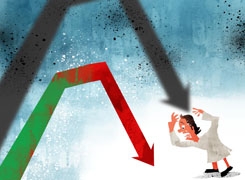Sanjeev Govila | Answer |Ask -Follow
Financial Planner - Answered on Feb 03, 2023
He has over 12 years of experience in financial planning and is a SEBI certified registered investment advisor; he is also accredited with AMFI and IRDA.... more

What happens when the market falls midway while you have invested for a longer term?
1. This is how the markets behave – if they were not to have volatility, they would give FD-type returns only. Note that I call it volatile behaviour and not risky behaviour.
2. Do not change your character just because markets are volatile – do not turn into a short term investor when markets go down. You should take out any investments only if either your goal for which that investment had been done has arrived or if that investment is no longer a good one to continue and you wish to shift to another better one.
I get excited when markets fall, rather than when they go up, because a fall gives me more opportunities to acquire good securities at low rates.
You may like to see similar questions and answers below
Jigar Patel | Answer |Ask -Follow
Stock Market Expert - Answered on Aug 06, 2023
Advait Arora | Answer |Ask -Follow
Financial Planner - Answered on Nov 06, 2023
Samraat Jadhav |2498 Answers |Ask -Follow
Stock Market Expert - Answered on Jul 12, 2024
Ramalingam Kalirajan |10870 Answers |Ask -Follow
Mutual Funds, Financial Planning Expert - Answered on Jan 20, 2025
Samraat Jadhav |2498 Answers |Ask -Follow
Stock Market Expert - Answered on Feb 13, 2025
Dr Dipankar Dutta |1837 Answers |Ask -Follow
Tech Careers and Skill Development Expert - Answered on Dec 05, 2025
Dr Shyam Jamalabad |108 Answers |Ask -Follow
Dentist - Answered on Dec 05, 2025
Dr Shyam Jamalabad |108 Answers |Ask -Follow
Dentist - Answered on Dec 05, 2025
Dr Shyam Jamalabad |108 Answers |Ask -Follow
Dentist - Answered on Dec 05, 2025
Dr Dipankar Dutta |1837 Answers |Ask -Follow
Tech Careers and Skill Development Expert - Answered on Dec 05, 2025
Ulhas Joshi |280 Answers |Ask -Follow
Mutual Fund Expert - Answered on Dec 05, 2025
Dr Dipankar Dutta |1837 Answers |Ask -Follow
Tech Careers and Skill Development Expert - Answered on Dec 04, 2025
Ravi Mittal |676 Answers |Ask -Follow
Dating, Relationships Expert - Answered on Dec 04, 2025
Anu Krishna |1745 Answers |Ask -Follow
Relationships Expert, Mind Coach - Answered on Dec 04, 2025
Anu Krishna |1745 Answers |Ask -Follow
Relationships Expert, Mind Coach - Answered on Dec 04, 2025































